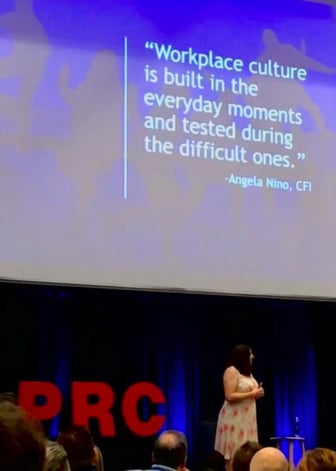Empathy as a Security Tool
Prime Secured continually tests, recommends and implements security hardware, software and processes across many different industries and venues. But security is much more than that. Over the years, we’ve learned one security element is more important than all the others combined. You can’t buy it, package it or wire it. We are talking about empathy.
Before you click out of this page thinking we’re getting too sentimental on you, please give us a moment to explain. We promise this “tool” will save you time and money – and it will help ensure the longevity of your enterprise.
During the current pandemic, empathy, as you can imagine, is more important than ever for organizations across the globe. We all find ourselves needing to take a breath before responding to subordinates – and we need to teach them to breathe, too. Everyone’s feeling isolated, people are on edge, and it’s manifesting as anger, intolerance and outbursts by employees at work.
But we still need to get things done; we still have customers counting on us, projects to complete and deadlines to meet. Empathy, in all its personal and corporate forms, can be a compelling part of the solution.
Angela Nino, CFI, Founder and Chief Executive Officer of Empathic Workplace, can prove empathy is more than a one-time lesson and is, instead, essential to the success of any organization. She has seen tangible, bankable results with corporations she’s worked with to establish a culture of empathy.
Angela’s background began as an asset protection and loss prevention expert. She is also a certified forensic interviewer who has worked with many security professionals across the U.S., including government officials and Fortune 500 security personnel. In her past life Angela worked with large retailers such as Target and Ralph Lauren bringing them the concept, “empathy as a security tool.”
“As business leaders, we need to demonstrate more empathy than we ever have,” Nino explained in a webinar hosted in conjunction with Prime, “because if we don’t lead with empathy, it will be hard for people to do what you need them to do.”
Angela Nino
The world is realizing it needs to find more effective ways to reach out to one another in these unsettling times.
Building a Culture of Trust to Aid Loss Prevention and Mitigate Workplace Violence
Even before the pandemic, Nino helped Target stores establish a cutting-edge approach to loss prevention with employees. Her goal, she explained, was to build rapport and trust with employees – a store of goodwill that the employer could draw on to get employees to admit mistakes they had made or cause them to feel so loyal they wouldn’t steal or act out at work. She used a nonconfrontational interviewing technique that has become the hallmark of her work.
“I remember employees thanking me as they were being fired and arrested,” she said. “They thanked me because I treated them with respect.”
The power of empathy is not just its effect on individuals. It helps companies build cultures of trust that pay off in many ways. Nino explained that “trust is built in small moments.” You can’t just say “Trust me,” she said. You have to orchestrate many moments of trust and that’s what adds up to a powerful culture that helps prevent losses.
To illustrate this concept, Nino shared a popular story from Brene Brown about a teacher who put a jar in her classroom to gather marbles. Every time the class collectively made a good decision, she put a marble in the jar. When the jar was full, the class received a reward. It’s the same in the workplace, Nino said. If you demonstrate many small moments of trust, it adds up to a renewable benefit that can:
- Make employees feel comfortable telling their story. This is a benefit not only when someone has done something wrong, but before they ever act out. If something is going on at home and the employee feels comfortable sharing it, they may be less likely to cause disruption at work. If they are unhappy at work, a culture of trust may make it possible for them to talk with you truthfully rather than “take revenge” by stealing, damaging something or hurting someone.
- Minimize unproductive distraction. “Teams that do not trust their companies or superiors waste cognitive resources watching their backs,” Nino explains. It’s better to have people focused on things such as collaboration and building the business than being obsessed with their unhappiness.
- Prompt employees to care about what you say. It’s an age-old problem with leaders and subordinates. You ask people to do things and they forget or get sloppy or refuse to do it. In a culture of caring, respect and trust (built through empathy), subordinates are more likely to listen and follow through because they don’t want to let you down.
Implementing Empathy as a Workplace Strategy
So, how does one initiate and carry out a corporate culture of empathy? Empathic demonstrations should be woven throughout all of an organization’s strategies, trainings and procedures. However, it still comes down to individual moments.
Generally, Nino suggests avoiding the dreaded trio of Silence, Secrecy and Judgement. When an employee comes to you with a problem or an admission of guilt or shame, do everything you can to avoid ignoring what they say, asking them to keep it a secret, or making a judgment that amounts to a condemnation of them.
“Empathy is the antidote to shame,” Nino explained. “If we feel not-worthy of connecting with someone, it feels awful because we could die without other people.” Human beings have a deep-seated need for each other, she explained, and if our connections with one another are threatened it can cause bullying, violence, depression, suicide, eating disorders and more – including acting out at work.
Many of these human reactions to disconnection have increased during the pandemic. You can be sure some of the people you work with are feeling loneliness, grief, worry and stress. Conducting regular mental health check-ins can strengthen your culture of trust and help avoid negative fallout during this time.
Nino warns that for this to work, we have to do more than look for an “I’m fine” answer. We need to find out more about the person’s story. Not just who has the virus, but how are other things going in their life. Are they in the middle of moving? Are the kids melting down during virtual classes? We don’t always have to provide solutions. Sometimes it’s enough to listen and let them know we care.
In other words, be authentic, Nino says. This is no time to pay lip service to empathy as the latest workplace pandemic fad. This time in history is a perfect time to recognize the timeless truth that human beings need empathy to be healthy – and so do workplaces.
The more your leaders and supervisors incorporate practices of empathy, the more benefit you gain. Employees will see how you treat them and others on the job, and the trust essential to an empathic culture will build gradually.
Other empathic workplace advice from Nino:
- If you find you are having private individual meetings after group meetings to talk about things people did not feel safe sharing in the group meeting, it may be a sign that your empathic culture needs a tune-up.
- When it comes to race-related discussions and similar encounters, avoid telling someone you understand something you can’t really understand as they do. “It can come across as a microaggression rather than as showing emotion,” Nino said. “Intention and impact are different. Sometimes it might be our turn to listen.”
- Empathy is something you have to demonstrate. You can’t just tell people you have it. Think through how empathy is demonstrated in your workplace and find specific opportunities to show it.
- Ensure that your organization has solid mental health options to help your team members when they make serious mistakes or when you’ve helped them identify a stress in their lives that could cause potential issues. It’s less expensive to provide help than it is to constantly pay for onboarding new people.
Empathy is More Than a Gratuitous Pandemic-Triggered Tool
The need for empathy has come to the forefront in workplaces during the pandemic. And some of us have more time on our hands to think about and implement empathy right now. But empathy is not important only during times like this.
At Prime, we believe security and loss prevention professionals are beginning to see empathy as a viable, practical security tool that truly helps them obtain tangible positive results. A culture of empathy coordinates perfectly with the equipment, software and processes we routinely integrate for our clients.
We encourage you to integrate empathy into your own security system. For more information, contact Angela Nino, CFI, Empathic Workplace at yes@empathicworkplace.com, 847-915-3800.
More Resources
Book: Dare to Lead by Brene Brown. “Leadership is not about titles or the corner office. It’s about the willingness to step up, put yourself out there, and lean into courage. The world is desperate for braver leaders. It’s time for all of us to step up.” A leader is anyone who takes responsibility for finding the potential in people and processes and has the courage to develop that potential.
Book: Permission to Feel by Dr. Marc Brackett. “The one thing that every CEO of every company should think about is, are the people managing the people in my organization emotionally intelligent, and how do the people feel in my organization?” (from interview with Worth).
Yale Center for Emotional Intelligence. “Emotions Matter. This belief is the core of our work. We conduct research and offer trainings that support people of all ages in developing emotional intelligence skills. We do this work because the well-being and sustainability of our society depends on each of us using our emotions wisely.”
Our Blog
Subscribe to the Prime Secured blog to receive the latest updates.


